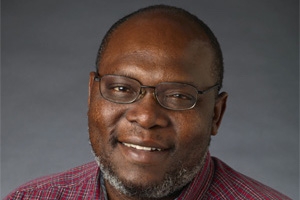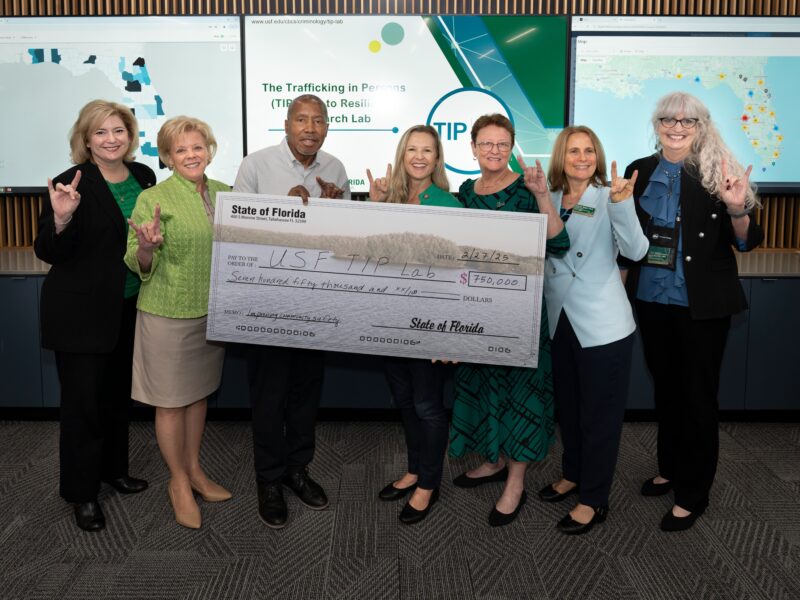Pictured above: Dr. Chapurukha Kusimba joins USF as a distinguished professor in the Institute for Advanced Studies in Culture and Environment.
Courtesy of American University
By Lauren Wood
Beneath his mask, Dr. Chapurukha Kusimba grinned as he recounted his days as a child in the Kaptola village in Africa.
Before becoming a prolific scholar and renowned expert in anthropology and archeology, Chapurukha “Chap” Kusimba had a humble beginning with larger-than-life dreams.
His adoration for human life began when he was introduced to the concept of the New World in the fourth grade. He would often watch geographic documentaries in class and learn about the different cultures that lived there.
“I was a kid in Kenya fantasizing about snow, so I wanted to experience it… I’d always wanted to go to Alaska and live in an igloo,” Kusimba said. “To see it, to feel it, to live the life of an Inuit.”
When Kusimba was 23, he followed a professor’s advice to go to Bryn Mawr college in Pennsylvania and pursue a career as an arctic specialist. In 1988, he went to Kodiak Island in Alaska and joined an excavation crew to help study ancient Koniag households.
After a fellow colleague passed away, Kusimba decided to end his time in Alaska. However, he was determined to finish his studies, so he moved back to the U.S. to further his education.
“I knew quite a bit about the United States… so I knew something about the African American experience, or the Black experience, in the New World,” Kusimba said. “But I wasn’t prepared for some basic things, like how big this country is.”
The following years surmounted in major academic success for Kusimba.
In 1994, he became an assistant professor at the University of Illinois in Chicago (UIC) and the Associate Curator of African Archaeology and Ethnology at the Field Museum of Natural History.
Six years later, Kusimba garnered the title of curator, and began teaching classes as a professor in the anthropology department at UIC. In 2013, he moved to Washington, D.C., to instruct at American University.
There, Kusimba shared his research about the dynamic relationship between power and inequality with his students. He educated them about its influence on past nations’ stability.
“I find in many ways that when I talk to students, it is not so much about giving them answers to those questions but helping them pause and find solutions to everyday problems,” Kusimba said. “But we can potentially look at the past, and from the past, we can glean something that we can then use to make this a much better place.”
In 2018, Kusimba was inducted as a fellow to the American Academy of the Arts and Sciences.Other inductees in 2018 included Barack Obama, Tom Hanks and Supreme Court Justice Sonia Sotomayer.
Prior to the COVID-19 pandemic, Kusimba was hired by the University of South Florida as a distinguished professor in the Institute for Advanced Studies in Culture and Environment.
“We were stuck in East Africa until August,” Kusimba said. “This is the first time I’m having these face-to-face interactions.”
After a long journey, Kusimba arrived at USF St. Petersburg, where he will teach Introduction to Archaeology, Peoples and Cultures of Africa, Precolonial Urban Cultures of Africa, and other courses according to his USF biography page.
“Coming to Florida was no culture shock. Florida, for anyone who is from East Africa, is very familiar. Very similar,” he said.
Although Kusimba is excited for the fall semester, he is unsure about what may happen due to the virus.
“The Delta variant of COVID-19 is scary because of the devastation it can cost,” he said. “I would love to see how students are. I would love to see the students’ faces, but we cannot do that.”
However, because of a rise in the Delta variant, fear of the unknown remains. Kusimba often ponders this period of uncertainty and the safety of his students on campus.
“We tend to ignore the past at our own peril,” Kusimba said. “It’s a never-ending day… a land of darkness.”
As someone who specializes in the past and studies trends from years prior, Kusimba is starting to feel like COVID-19 is a bad day in Alaska, where the sun may never set.
Lauren Wood is a senior mass communications and digital studies major at USF St. Petersburg.



